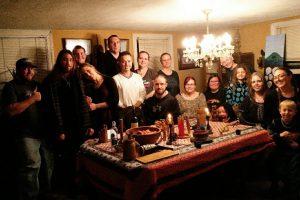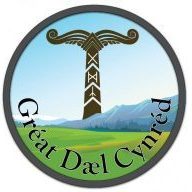
One thing that differentiates GVK from some other Heathen groups is its oath of frith. People can stand shoulder to shoulder within the same ritual space to honor the gods, but that doesn’t necessarily mean they have frith. Frith is something more. It is a sacred sentiment that turns a kindred from a church into family.
Historical Frith
Historically, frith existed on at least three levels: familial, extra-familial, and religious.
In contrast to the typical modern Western notions of individualism, the early Germans were more communal minded. In particular, family commanded their primary allegiance. Several groups of closely related families formed a kin. The kin’s primary job was to protect its own against rival kins. As an assault or insult against an individual was perceived as an attack on the individual’s entire kin, early Germanic society was replete with feuding (Todd 32-33).
Frith is what existed within the family structure and defined its dynamics. There was no graver taboo than to take up arms against a kinsman. Kinsmen were expected to come to peaceful accord with one another. Further, they were expected to pledge mutual defense and united cause against rivals. Frith has been described as “reciprocal inviolability,” the understood obligation of kinsmen to uphold peace within the kin and to seek vengeance for sake of the kin (Gronbech 18-20).
When extra-familial social organizations began to form and assume relevance within Germanic culture, they could model their sense of security only by referencing the familial structure. The comitatus or warband was a gathering of warrior retainers, not only from different families but often from different tribes, under a warlord’s command. The warlord became the “father” of his warband, and his lady became the “mother.” Involved drinking ceremonies (symbel) were used to reinforce a sense of fictive kinship (Enright 17). These fictitious, warlike families whose family business was plunder and conquest rampaged through the Roman Empire.
Women enjoyed a special place within constructing conceptions of frith. Seership and psychic ability were quintessentially feminine traits; further, weaving was the ultimate female domestic activity. Between these two things, women became the “frithweavers” of Germanic society (Herbert 16). Within the Icelandic sagas, women were known for “cold counsel,” inspiring men to war and vengeance when they felt slighted, and shaming them as “cowards” when the menfolk were lax in prosecuting the enemies of the kin. However, within the structure of the warlike comitatus, the Lady of the Hall greeted guests, offered gifts, and established the social hierarchy of warriors within the hall’s involved drinking rituals (Enright 22). Likewise, when women served as queens, it was their generosity, charm, and wisdom that inspired peace among the lord’s fighting men (Herbert 27). The Germanic heroic ideal cannot be dismissed as exclusively “masculine,” for one must take into account women’s special prerogative to arbitrate manliness in terms of war and peace.
Finally, frith could exist within a religious sense. In contrast to Odin, who engendered strife, some of the Vanic deities were especially associated with peace. In the processions of Nerthus, the ancient terrestrial goddess, hostilities ceased and weapons were lain aside (Tacitus). Freyr, and the various kings and heroes who were effectively mortal stand-ins for Freyr, were likewise associated with plenty and cessation of hostilities (Sheffield 32, 35). But peace was generally the preserve of religious places in general, and could service deities beyond the Vanir. A field sacred to Thor was declared to be a frithstead; it could not be defiled by blood or excrement (Palsson 30). Its eventual defilement was cause for an ongoing feud.
Frith is sometimes confused with grith. If the former is the sense of peace and familiarity within a group, the latter is an imposed peace upon a group, or between different groups. For example, in Anglo-Saxon times, grith meant that no one could employ violence or threats, or carry weapons within the presence of a king (Pollington 111).
One could go into more detail about these things. One might even tread into survivals of frith from Medieval times. But it is hoped the above suffices to illustrate the concept of frith as the sense of inviolability within the family, within social groups fictively imitating the family, or within a religious milieu.
Frith and the Modern Heathen
It was common, at least until fairly recently, to see people misusing the term “frith” on online Heathen forums. I can remember a time when it was a fashion to sign one’s posts as “in frith,” or some such sentiment. While they may be well-meaning people suggesting they come in peace, to invoke frith in this manner is nonsense. Frith exists for a family, within a family. It does not exist within some random online site between strangers trading pixels with one another.
But let’s move away from internet Heathenry and into how groups operate in the real world.
Some groups operate more or less as churches. They accept anyone (within very broad limits), and the point is to meet at given times to perform religious rituals. While there is an expectation of behaving oneself, and while some of these local groups can forge close personal bonds, at the end of the day there is no formal oath that ties people together. People can ultimately come and go as they please and sever personal bonds. There is no value judgement here: various Heathen, Pagan and Druid groups like to perform in this manner, and do well with this model.
However, there is another model. An oath of frith transforms what might have been a church into a family, or brotherhood. Oathed members are not people who simply share ritual space. They have close personal commitments, and they cannot simply leave and sever ties.
What does frith mean within a practical sense in the modern era? It seems to be usually interpreted as:
- The responsibility to promote welcoming, positive, and nurturing vibes between oathed members at all levels and occasions.
- An expectation of reasonable aid between oathed parties. A sense that people will support each other’s causes and concerns, and look to each other’s well-being.
- Conflict is taken behind closed doors to be hashed out. Enmity must be assuaged. If it cannot, it eventually would be grounds for resignation or expulsion.
- Oathed members strive to further the kindred and its causes, and to represent the kindred well to other Heathens.
Frith turns kindreds into families, or into groups mimicking familial loyalties, underlined by a religious milieu.
GVK and Frith
GVK was officially formed in Midsummer 2012. By Midsummer 2013, the existing members had felt they have evolved closely enough to warrant taking an oath of Frith.
Our oath has changed slightly over the years, but the current incarnation gets straight to the point:
“As long as I remain a member of Great Valley Kindred, I swear to uphold the frith of the Kindred, and make efforts to ensure that the Kindred thrives and it’s worth endures.”
In time we came to meet in a hall (farmhouse) where the proverbial lord honors Ing (Freyr). Within Ing’s hall of peace and plenty, frith flows freely and with fervor. Further, the proverbial lady of the hall serves as frithweaver, welcoming guests with all due hospitality, and serving as cupbearer for symbel rites.
It works well for us. That is not to say we have not had growing pains. Have you ever had a person of dubious mental well-being want to oath to your kindred not long after meeting you? We have (twice). Have you ever had to expel an oathed member for long term negligence and abuse of the oath? We have, sadly. To alleviate some of these issues, GVK instituted a few rules:
- There are three stages of membership. The oath of frith is required at the highest stage, but members must first progress through two prior stages. This gives the kindred and the member due time to assess each other and ensure they are compatible with one another.
- The oath is in effect for only as long as one remains a member of the kindred. If one were to move far away, it is hard to see how they could realistically maintain an oath of frith. Further, if one is (gods forbid) expelled from the kindred, they most certainly are no longer in a state of frith with the kindred.
- We renew our oath at every ritual. (If done outside, this creates a “virtual hall.”) This reminds ourselves, and our guests, of our obligations to each other.
An oath of frith is a sacred thing and not to be taken lightly. But the bonds of familiarity it officially enshrines cannot be undervalued. We are not a church, but a family or religious brotherhood. We prize our oath.
Works Cited
Enright, Michael J. Lady With a Mead Cup: Ritual, Prophecy and Lordship in the European Warband from La Tene to the Viking Age. Portland: Four Courts Press, 2007. Print.
Gronbech, Wilhelm. The Culture of the Tuetons . Vol. 1 & 2. Oxford University Press, 1931. Print.
Herbert, Kathleen. Peace-Weavers and Shield-Maidens: Women in Early English Society. London: Anglo-Saxon Books, 2009. Print.
Palsson, Hermann & Edwards, Paul, trans. Eyrbyggja Saga. New York: Penguin Books, 1989. Print.
Pollington, Stephen. The Meadhall. Anglo-Saxon Books, 2010. Print.
Sheffield, Ann Groa. Frey: God of the World. 2nd edition. lulu, 2007. Print.
Tacitus. Medieval Sourcebook: Tacitus: Germania. n.d. 1 July 2017. <https://sourcebooks.fordham.edu/source/tacitus1.html>.
Todd, Malcolm. The Early Germans. Malden: Blackwell Publishers, 1992. Print.
